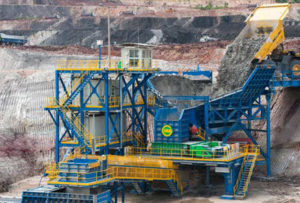The world’s largest mining trade show (http://www.pdac.ca/convention) this year again attracted a slew of Australian mining companies, services exporters, government officials and investment promoters. Peter Diekmeyer writes.
Exhibitors, participants and presenters, including a platoon of Australians. attribute increased traffic at the Prospectors and Developers Association of Canada’s (PDAC) annual conference to renewed interest in the sector.
More than 24,000 prospectors, geologists, sector suppliers and investors, from more than 100 countries, crammed the Metro Toronto Convention Centre, earlier this year.
“Every major Australian company is here,” said John Shanahan, president and chief executive of Tintina Resources, which is developing a high-grade copper deposit in Butte, Montana in the United States.
“Canada is the place for mining companies to do business. People here understand that.”
Tintana is a case in point. At first glance the company has little connection with Canada. Shanahan grew up and went to school in Australia. Tintina’s majority shareholder, Sandfire Resources, is Australian-based.
Tintina’s major asset is in the United States, where Shanahan, also lives. However, Tintina is listed on a Canadian stock exchange and is nominally domiciled there.
“It’s much cheaper to list on a Canadian exchange than it is in Australia and Canada’s 43-101 mineral resource disclosure standards, have unparalleled international credibility,” Shanahan said. “For us a Canadian listing is a no-brainer. But we also use PDAC to meet our Canadian shareholders, seek out future partners and keep abreast of industry developments.”
Doug Ramshaw, a director at Vendetta Mining, which is looking to build interest in the company’s zinc/lead exploration play in Queensland, agrees that PDAC’s attraction is in part due to the fact that it is a great place for developer to connect with financiers.
This puts PDAC in the same playing field as the Diggers and Dealers event, which will take place in August in Kalgoorlie, Western Australia.
Sector suppliers focus on innovation
As usual, the PDAC halls were packed with sector suppliers, who used the event to plug their wares to a global audience.
According to Monika Portman, a spokesperson with Boart Longyear, a drilling services, tooling and equipment provider, innovation remains a key theme.
“Mining has gone through hard years and companies have been tightening expenses to maintain profitability or cut losses,” said Portman. “That means they need to do more with less.”
Boart Longyear, which regards Australia and North American as its two top markets, has been increasingly refining a “complete automation suite,” to help bring down perennially high sector labour costs.
This year Portman’s team was using PDAC to talk up the company’s hands-free rod handling, which she says makes the drill preparation less accident prone.
“Safety isn’t just an operational cost,” she explains. “Most successful mining companies regard it a core social responsibility. Our goal is to help them fulfill that role.”
Caterpillar, which has been increasingly developing and marketing autonomous trucks, and whose banners and advertising adorned the PDAC walls, also used the event to great effect.
A turnaround in sight?
The strong PDAC attendance, which was up nearly 10 per cent relative to 2016 levels, provides an effective signal that the mining industry may be turning around, following a major trough.
According to data accumulated by S&P Global Market Intelligence, 2016 marked the fourth consecutive year of declining exploration budgets.
Australia accounted for 13 per cent total gold exploration. Gold’s share of Australia’s total budget jumped to 57 per cent from 48 per cent in 2015, due in part to falling base metals budgets.
Australia’s US$510 million (A$677 million) gold budget overtook Canada as the top gold exploration destination for the first time in more than a decade.
The yellow metal’s attraction among PDAC conference goers was further strengthened by a nine per cent increase in prices since the start of the year in US dollar terms.
This, coupled with the fact that production costs are often priced in local currencies that have weakened relative to the US dollar in recent years, has significantly increased potential profitability levels.
Australia minerals seek investment
Western Australia received more news at PDAC, when the region was named the world’s third best mining jurisdiction in the prestigious Fraser Institute’s annual rankings.
The only two regions ranked higher were Saskatchewan and Manitoba, two provinces in Canada, where the Fraser Institute itself is based, a factor which may have influenced survey methodology.
Nevertheless the strong results provided momentum to Australian Government officials, such as Richard Blewett, branch head, mineral systems, resources division, at Geoscience Australia, who used PDAC to drum up investor interest in the country.
“We are open for business,” said Blewett. “Our data show that companies that invest in Australian exploration get a far better investment return than they do in other jurisdictions. We are here to get that message out.”
Investment will come back
As usual, PDAC’s most popular event with insiders was the Letter Writers presentations that took place the Sunday before proceedings started.
Rick Rule, president of Sprott U.S. Holdings, as has been the case in recent years, gave the keynote presentation, which set the increasingly optimistic tone that would prevail in the coming days.
“How many people in this room believe that in six years, when you go into the garage your car will start?” asked Rule rhetorically.
“Well then you have to believe that oil prices will go up. The IEA says that the average cost of producing oil is US$60 a barrel, when you include explorations and write-offs.
“If oil is US$50 per barrel now, that means the price has to go up. The same thing applies to many rare minerals and base metals. The cost of producing them is higher than existing selling prices. That means, over time the pressures on prices will be upwards.”
PDAC will be back next year between 4-7 March.
Peter Diekmeyer is a Canada-based business journalist, specialising in mining and resources.








